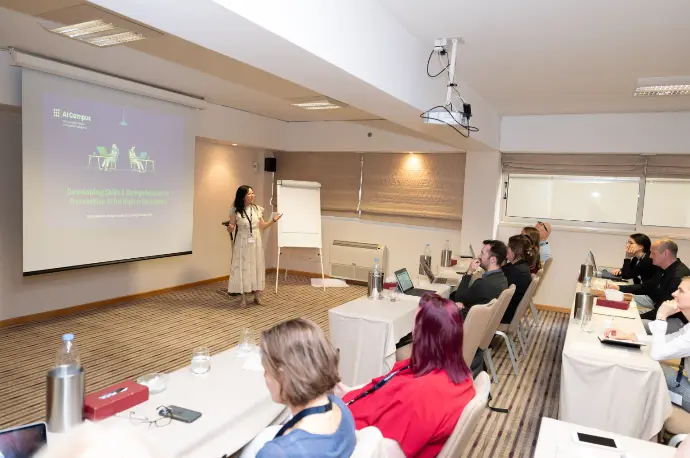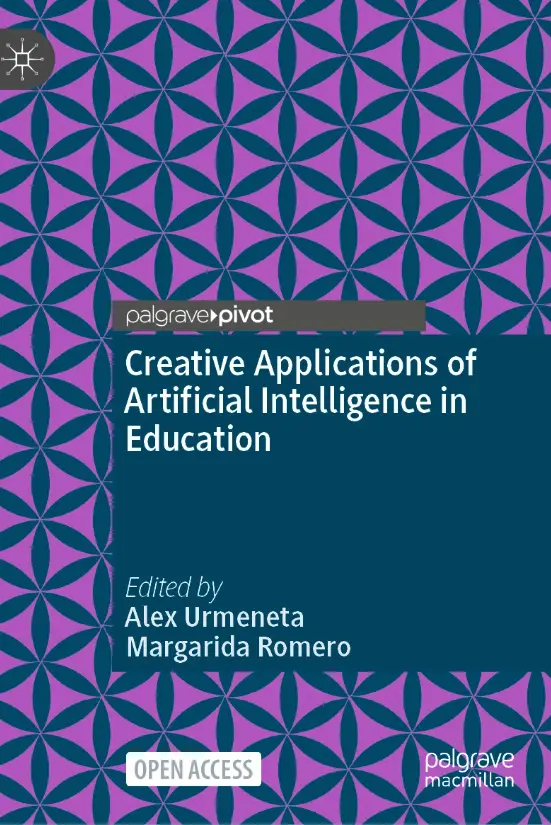Read here all the ADMIT related news items

First official onsite ADMIT partner meeting!
On December 11-12, 2024, the ADMIT consortium met in Maastricht, Netherlands, to discuss progress on their work integrating generative AI and large language models (LLMs) into higher education.
The first day featured updates on key project areas, including mapping the impact of LLMs, developing ethical guidelines, and designing professional development programs for educators. Each work package presented its findings, sparking constructive dialogue on challenges and next steps. Day two was dedicated to peer learning activities, focusing on course design and sharing practical approaches for incorporating AI into teaching and learning.
Collaboratively Creating an Open Online Course on Generative AI
Generative AI tools like ChatGPT and DALL-E have rapidly transformed how we work, learn, and engage with technology. While offering exciting opportunities, these tools also present ethical challenges and knowledge gaps, particularly in education.
To address this, the ADMIT project, led by the European Association of Distance Teaching Universities (EADTU) and partners, is developing an open online course on generative AI. Hosted on the AI Campus platform, this course will provide flexible, high-quality content for Higher Education Institutions (HEIs) to integrate into their curricula.
At the I-HE2024 conference in Limassol, Cyprus, experts Raffael Ruppert (Stifterverband), Yuzhi Wang (AI Campus), and George Ubachs (EADTU) hosted a workshop exploring the skills and ethical considerations required for generative AI in education. Key discussions focused on creating effective learning scenarios and incorporating digital content into both online and on-site teaching.
This initiative highlights Europe’s commitment to equipping educators and students with the tools and knowledge to navigate the evolving landscape of generative AI responsibly and effectively. Stay tuned for updates on this transformative project!

Introducing ChatGPT Edu
An affordable offering for universities to responsibly bring AI to campus.
We're announcing ChatGPT Edu, a version of ChatGPT built for universities to responsibly deploy AI to students, faculty, researchers, and campus operations. Powered by GPT-4o, ChatGPT Edu can reason across text and vision and use advanced tools such as data analysis. This new offering includes enterprise-level security and controls and is affordable for educational institutions.
Creative Applications of Artificial Intelligence in Education
This open access book explores the synergy between AI and education, highlighting its potential impact on pedagogical practices. It navigates the evolving landscape of AI-powered educational technologies and suggests practical ways to personalise instruction, nurture human-AI co-creativity, and transform the learning experience. Spanning from primary to higher education, this short and engaging volume proposes concrete examples of how educational stakeholders can be empowered in their AI literacy to foster creativity, inspire critical thinking, and promote problem-solving by embracing AI as a tool for expansive learning.
AI Revolution in Education
What you need to know
The AI revolution is transforming education at an unprecedented pace, offering game-changing opportunities to personalize learning experiences, support teachers in their daily tasks, and optimize education management. Recent research demonstrates the immense potential of AI to boost productivity in knowledge work, with one study finding that consultants using GPT-4 completed more tasks, worked faster, and produced higher-quality outputs compared to those without AI assistance (Dell’Acqua et al., 2023). The rapid advancement of AI capabilities is evident when comparing the state of the technology just a year ago. Today, AI models not only can engage in complex, context-aware conversations, generate human-like text, and even assist with coding tasks but can also combine and generate content across different modalities like text, images, audio, and video. This exponential growth in AI capabilities is expected to continue, enabling the development of increasingly sophisticated tools to support the education system.

Get to know the ADMIT team
Official Kick-Off meeting of the ADMIT project
On the 15th of January 2024 the ADMIT partnership kicked-off the start of their project. The 3 years ErasmusPlus project coordinated by EADTU is aimed at creating an Inclusion Reference Framework for higher education institutions along with practice-oriented instruments to assess and enhance inclusion policies and practices. This enables leaders, intermediary educational support services, teaching staff, and students to improve inclusion across all levels—course, curriculum, and institutional.
In all successive phases of the project, institutional partners develop synergies, will leverage their expertise and experience. The project aligns with the concepts of inclusion, equity, diversity, and inclusion challenges as defined by the European Commission, reinforcing the shared European language and approach. Inclusion challenges encompass disabilities, health problems, educational system barriers, cultural differences, social barriers, economic barriers, discrimination and geographical barriers (Erasmus+).
These challenges are encountered by individual or groups of students throughout their entire academic journey, from pre-access preparation, fair admission, personalized learning and study progression, equitable assessments and examinations, and adequate preparation for their future careers.
Do you want to know more, stay tuned!


